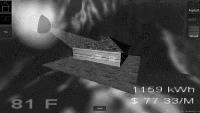Use of Augmented-Reality in Teaching Energy Efficiency: Prototype Development and Testing

This paper reports on the design, development, and preliminary testing of a prototype Augmented Reality (AR) application for residential energy use education. This tablet-based AR application simulates the impact of different residential building design characteristics on both indoor temperature (for passive heating/cooling) and annual energy use and cost (for mechanical HVAC).
The application was developed by an interdisciplinary team of researchers/educators from three related fields: architecture, interdisciplinary education, and computer science. The interdisciplinary model integrates three distinct lenses: 1) passive design and energy efficiency education, 2) AR as an interactive modality, and 3) a computationally complex building performance simulation model. The paper reports on the results of an experiment in which university students in a school of architecture used the prototype.
Results from the pre- and post- surveys conducted show consistent and high improvement in the students’ confidence in their knowledge of the topics following the use of the prototype. Student feedback was also generally positive. The project described in this paper also illustrates the considerable potential that interdisciplinary collaboration offers for architectural research through enabling architectural researchers to tackle more complex issues and developing a better understanding of the research approaches and expectations in other disciplines.
keywords: augmented reality, energy efficiency, passive design, education, performance simulation


Add comment
Log in to post comments